八年级英语上册Unit 1 Television Lesson 3 The Big Game 导学案(含答案)
文档属性
| 名称 | 八年级英语上册Unit 1 Television Lesson 3 The Big Game 导学案(含答案) |
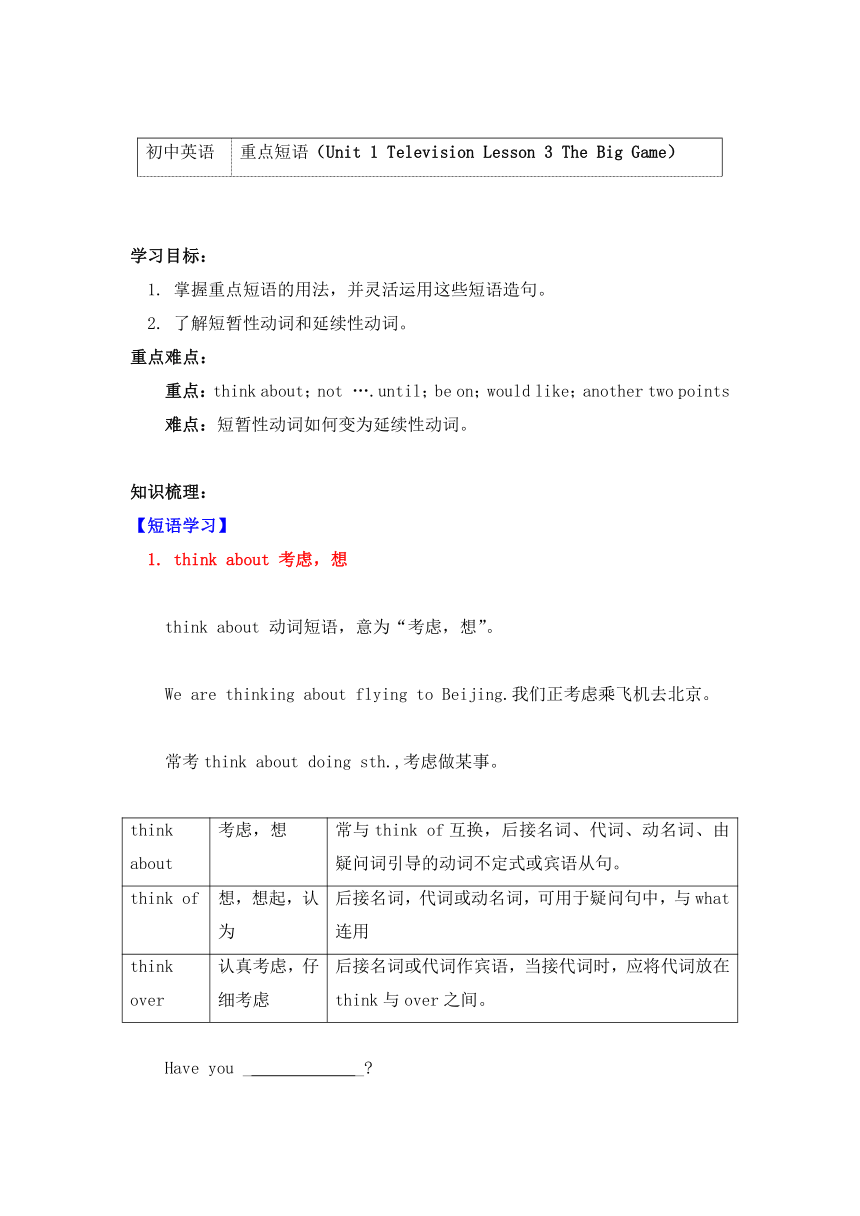
|
|
| 格式 | doc | ||
| 文件大小 | 93.5KB | ||
| 资源类型 | 教案 | ||
| 版本资源 | 北师大版 | ||
| 科目 | 英语 | ||
| 更新时间 | 2020-09-30 16:13:37 | ||
图片预览

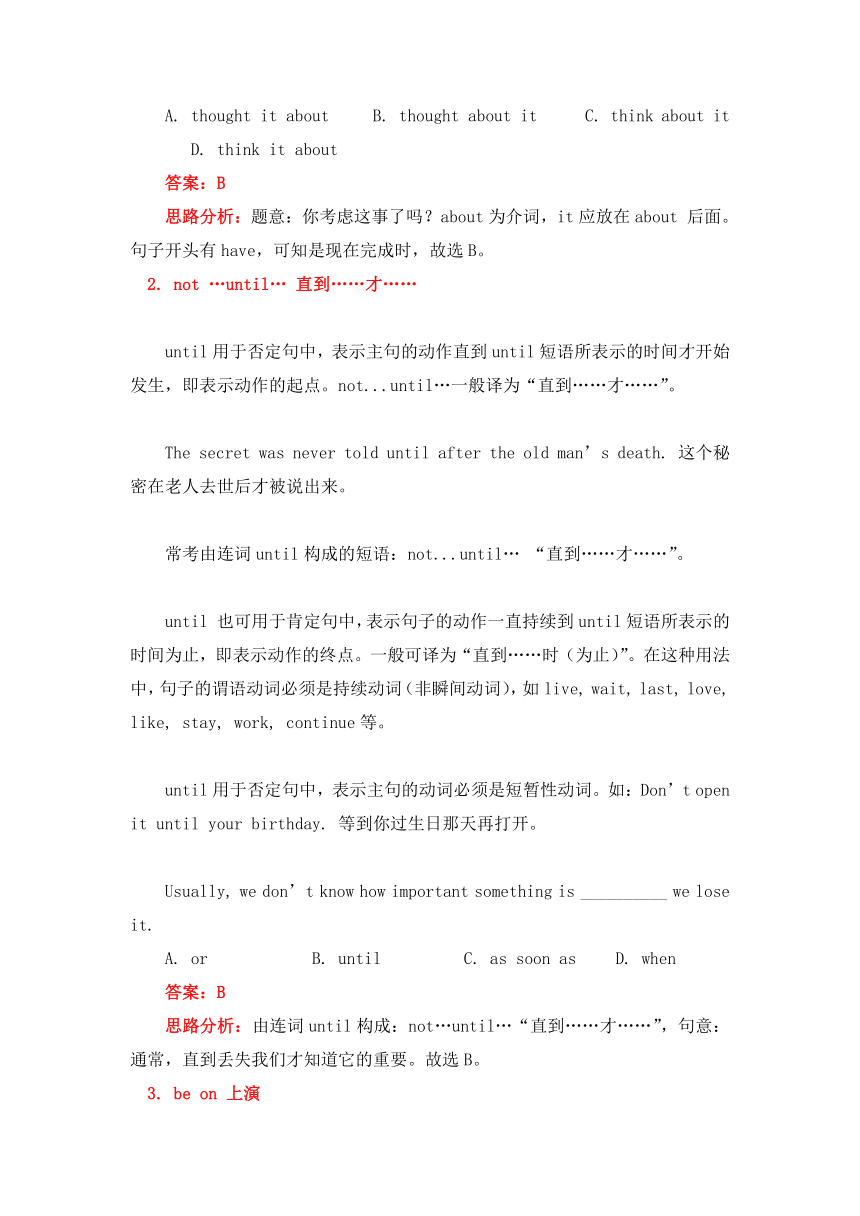
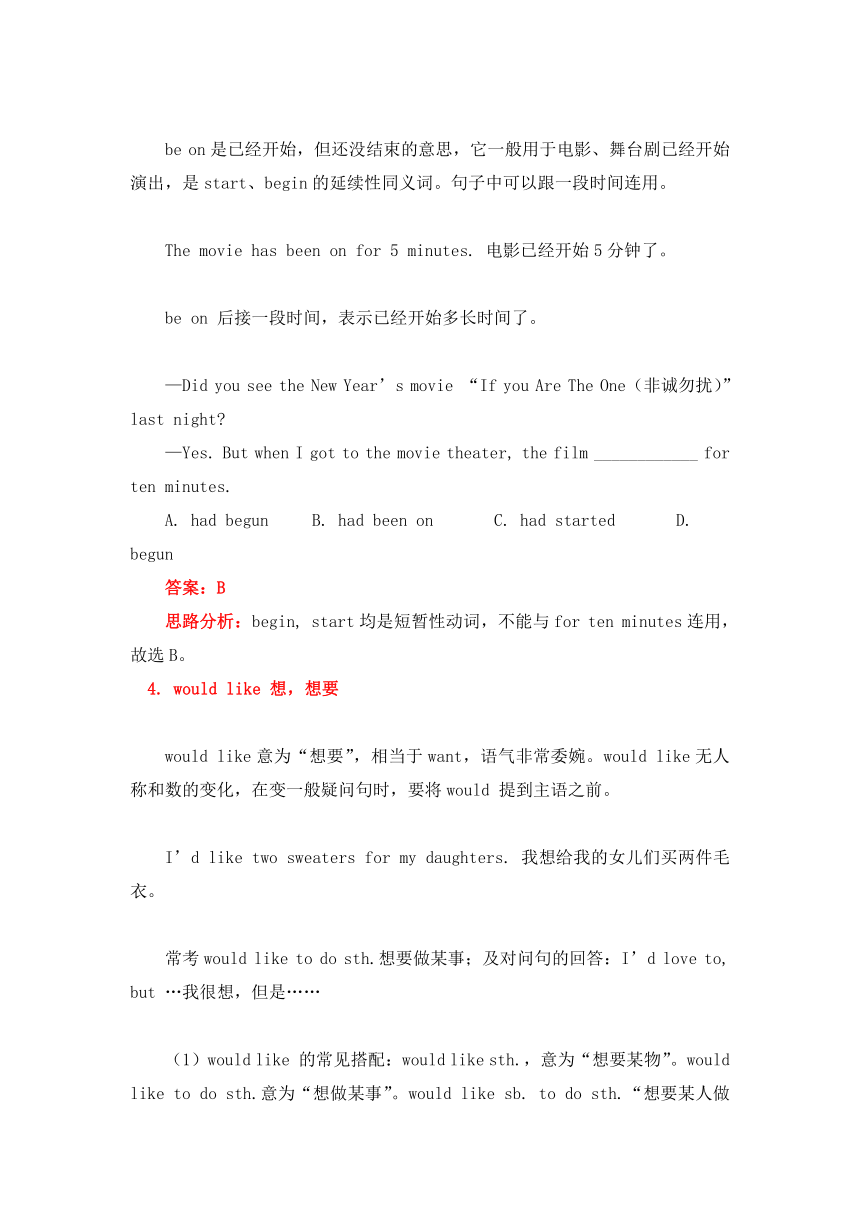
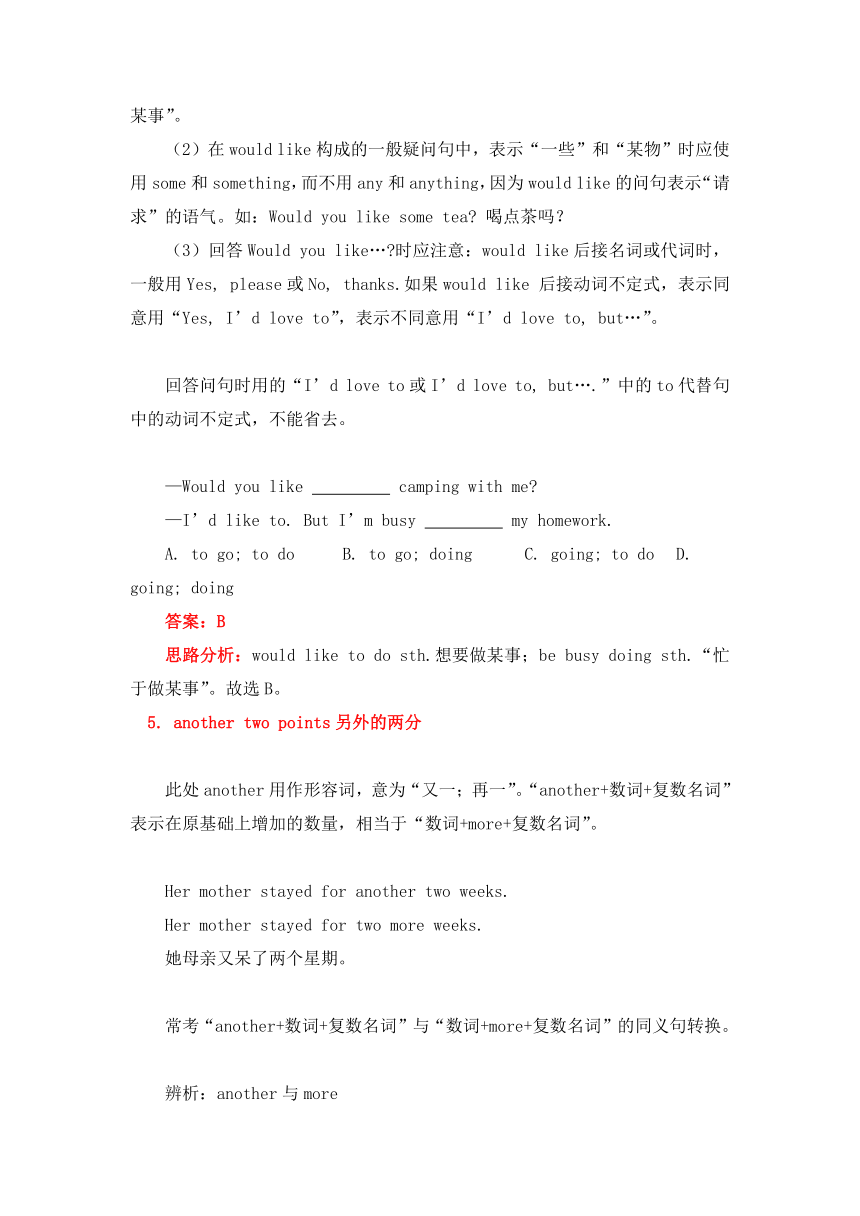
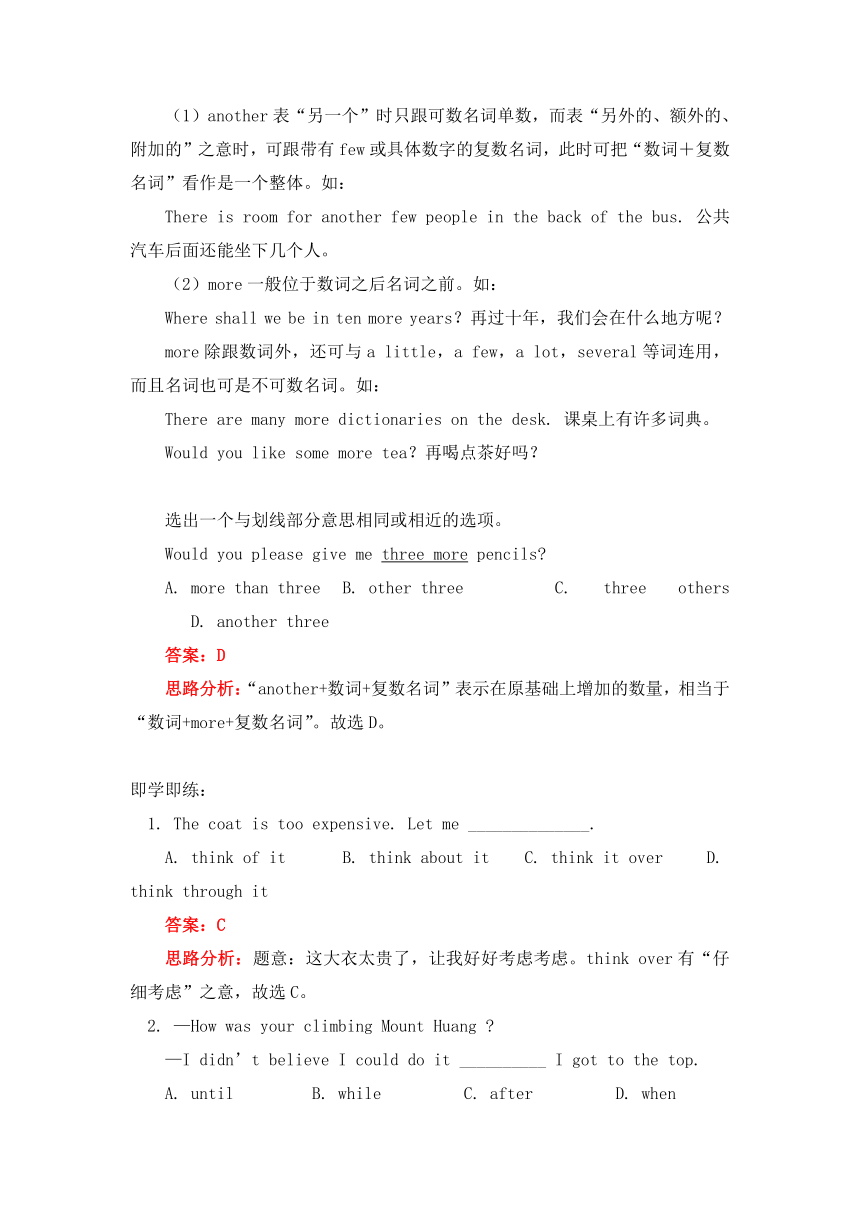
文档简介
初中英语 重点短语(Unit 1 Television Lesson 3 The Big Game)
学习目标:
1. 掌握重点短语的用法,并灵活运用这些短语造句。
2. 了解短暂性动词和延续性动词。
重点难点:
重点:think about;not ….until;be on;would like;another two points
难点:短暂性动词如何变为延续性动词。
知识梳理:
【短语学习】
1. think about 考虑,想
think about 动词短语,意为“考虑,想”。
We are thinking about flying to Beijing.我们正考虑乘飞机去北京。
常考think about doing sth.,考虑做某事。
think about 考虑,想 常与think of互换,后接名词、代词、动名词、由疑问词引导的动词不定式或宾语从句。
think of 想,想起,认为 后接名词,代词或动名词,可用于疑问句中,与what连用
think over 认真考虑,仔细考虑 后接名词或代词作宾语,当接代词时,应将代词放在think与over之间。
Have you _ _?
A. thought it about B. thought about it C. think about it D. think it about
答案:B
思路分析:题意:你考虑这事了吗?about为介词,it应放在about 后面。句子开头有have,可知是现在完成时,故选B。
2. not …until… 直到……才……
until用于否定句中,表示主句的动作直到until短语所表示的时间才开始发生,即表示动作的_è?·???_。not...until…一般译为“直到……才……”。
The secret was never told until after the old man’s death. 这个秘密在老人去世后才被说出来。
常考由连词until构成的短语:not...until… “直到……才……”。
until 也可用于肯定句中,表示句子的动作一直持续到until短语所表示的时间为止,即表示动作的终点。一般可译为“直到……时(为止)”。在这种用法中,句子的谓语动词必须是持续动词(非瞬间动词),如live, wait, last, love, like, stay, work, continue等。
until用于否定句中,表示主句的动词必须是短暂性动词。如:Don’t open it until your birthday. 等到你过生日那天再打开。
Usually, we don’t know how important something is __________ we lose it.
A. or B. until C. as soon as D. when
答案:B
思路分析:由连词until构成:not…until…“直到……才……”,句意:通常,直到丢失我们才知道它的重要。故选B。
3. be on 上演
be on是已经开始,但还没结束的意思,它一般用于电影、舞台剧已经开始演出,是start、begin的延续性同义词。句子中可以跟一段时间连用。
The movie has been on for 5 minutes. 电影已经开始5分钟了。
be on 后接一段时间,表示已经开始多长时间了。
—Did you see the New Year’s movie “If you Are The One(非诚勿扰)” last night?
—Yes. But when I got to the movie theater, the film ____________ for ten minutes.
A. had begun B. had been on C. had started D. begun
答案:B
思路分析:begin, start均是短暂性动词,不能与for ten minutes连用,故选B。
4. would like 想,想要
would like意为“想要”,相当于want,语气非常委婉。would like无人称和数的变化,在变一般疑问句时,要将would 提到主语之前。
I’d like two sweaters for my daughters. 我想给我的女儿们买两件毛衣。
常考would like to do sth.想要做某事;及对问句的回答:I’d love to, but …我很想,但是……
(1)would like 的常见搭配:would like sth.,意为“想要某物”。would like to do sth.意为“想做某事”。would like sb. to do sth.“想要某人做某事”。
(2)在would like构成的一般疑问句中,表示“一些”和“某物”时应使用some和something,而不用any和anything,因为would like的问句表示“请求”的语气。如:Would you like some tea? 喝点茶吗?
(3)回答Would you like…?时应注意:would like后接名词或代词时,一般用Yes, please或No, thanks.如果would like 后接动词不定式,表示同意用“Yes, I’d love to”,表示不同意用“I’d love to, but…”。
回答问句时用的“I’d love to或I’d love to, but….”中的to代替句中的动词不定式,不能省去。
—Would you like camping with me?
—I’d like to. But I’m busy my homework.
A. to go; to do B. to go; doing C. going; to do D. going; doing
答案:B
思路分析:would like to do sth.想要做某事;be busy doing sth.“忙于做某事”。故选B。
5. another two points另外的两分
此处another用作形容词,意为“又一;再一”。“another+数词+复数名词”表示在原基础上增加的数量,相当于“数词+more+复数名词”。
Her mother stayed for another two weeks.
Her mother stayed for two more weeks.
她母亲又呆了两个星期。
常考“another+数词+复数名词”与“数词+more+复数名词”的同义句转换。
辨析:another与more
(1)another表“另一个”时只跟可数名词单数,而表“另外的、额外的、附加的”之意时,可跟带有few或具体数字的复数名词,此时可把“数词+复数名词”看作是一个整体。如:
There is room for another few people in the back of the bus. 公共汽车后面还能坐下几个人。
(2)more一般位于数词之后名词之前。如:
Where shall we be in ten more years?再过十年,我们会在什么地方呢?
more除跟数词外,还可与a little,a few,a lot,several等词连用,而且名词也可是不可数名词。如:
There are many more dictionaries on the desk. 课桌上有许多词典。
Would you like some more tea?再喝点茶好吗?
选出一个与划线部分意思相同或相近的选项。
Would you please give me three more pencils?
A. more than three B. other three C. three others D. another three
答案:D
思路分析:“another+数词+复数名词”表示在原基础上增加的数量,相当于“数词+more+复数名词”。故选D。
即学即练:
1. The coat is too expensive. Let me ______________.
A. think of it B. think about it C. think it over D. think through it
答案:C
思路分析:题意:这大衣太贵了,让我好好考虑考虑。think over有“仔细考虑”之意,故选C。
2. —How was your climbing Mount Huang ?
—I didn’t believe I could do it __________ I got to the top.
A. until B. while C. after D. when
答案:A
思路分析:not…until…直到……才……。根据句意“直到我爬到山顶我才相信我能做到”可知,故选A。
3. —How long the film KING KONG ?
—For just several minutes.
A. did, begin B. has, begun C. has, been on D. did, been on
答案:C
思路分析:根据回答,可知问句中要用持续性动词,现在完成时要用has been on,故选C。
4. —Jane, would you like to go shopping with me this afternoon?
—
A. Oh, I’d love to. B. I want to buy some things for you.
C. I’d like. D. Why don’t you do it yourself?
答案:A
思路分析:回答Would you like…? would like 后接动词不定式,表示同意用“Yes, I’d love to”,表示不同意用“I’d love to, but…”,故选A。
5. —Have you finished your work yet?
—No, not yet. It’ll take me _____________ ten minutes.
A. other B. another C the other D. more
答案:B
思路分析:根据句意:—你还没完成作业吗?—没呢。还得花费我10分钟。“another+数词+复数名词”表示在原基础上增加的数量,故选B。
同步练习:
(答题时间:20分钟)
一、单项选择
*1. The little girl didn’t stop crying ________ she found her mother.
A. after B. until C. because D. when
*2. —I didn’t hear you come in just now.
—That’s good. We tried _______ any noise, for you were sleeping.
A. not make B. not to make C. to make D. making
3. They didn’t go to bed_____ the work was finished.
A. when B. while C. until D. after
4. —Jim, you look so tired!
—Oh, I didn’t go to bed ______ it was 12 o’clock last night.
A. until B. as C. if D. before
**5. —You are late. The meeting _________ for about ten minutes.
—I’m sorry. The traffic is heavy.
A. has begun B. began C. has been on D. has started
**6. The film __________ for ten minutes when we got to the cinema.
A. had already been on B. had already begun
C. have already been on D. have already begun
7. —Would you like to play basketball with us this afternoon?
— , I have to study for tomorrow’s test.
A. I’d love to B. I’m afraid not C. Sounds good D. No problem
二、完成句子
1. 他妻子很乐意他辞去工作。
His wife would love him his job.
2. 警察在追捕一名昨夜逃跑的犯人。
The policemen are a prisoner who escaped last night.
3. 王先生,你今天看起来很有精神。
Mr. Wang, you seem today.
4. 我会在这个俱乐部再待五年。
I will stay with the club.
5. 魔术表演将在红楼影院演出。
The will be on at Hong Lou cinema.
三、完形填空
Long ago,in a small village of Wakefield lived two farmers,Harry and Peter. Harry was very hard working while Peter was 1 . Every day Harry got up early and came home late, but Peter walked around for fun.
One summer there was no 2 and the crops(庄稼) were dying. Harry thought, “I must do something to save these crops, or they shall die.” With this 3 in mind, he went out to find a river so that he could dig a canal(沟渠) to his field. He walked on and on, feeling tired and thirsty. After a 4 search, he found a river full of blue water. He was very happy. He started digging a canal to his field. 5 it was noon his wife sent their daughter to bring Harry home 6 lunch. But Harry did not go. He did not want to leave his work unfinished. He completed his work 7 at night. He was very satisfied. He went home, had a good meal and 8 into a sound sleep.
Peter did the same. But he was not at all determined(有决心的). He also 9 digging a canal to his field but he didn’t have his work completed. His field did not get 10 water and all his crops died.
Harry’s field would be watered when needed. He had a good harvest because of his hard work.
1. A. cruel B. lazy C. careless D. silly
2. A. rain B. wind C. cloud D. river
3. A. feeling B. dream C. problem D. thought
4. A. quick B. long C. slow D. special
5. A. Whether B. Although C. When D. Unless
6. A. for B. to C. with D. at
7. A. early B. far C. late D. deep
8. A. fell B. looked C. turned D. walked
9. A. stopped B. loved C. forgot D. started
10. A. clean B. enough C. 1ittle D. fresh
答案:
一、单项选择
1. B 解析:考查从属连词。not…until…直到……才……。句意:小女孩直到找到妈妈才停止哭泣。故选B。
2. B 解析:考查非谓语动词的用法。try to do sth.意为“努力/尽力做某事”,否定式为 try not to do sth.,句意指尽量不去制造任何噪音。故选B。
3. C 解析:本题考查连词的用法。not…until…“直到……才……”。句意为“他们直到完成工作才去睡”,故选C。
4. A 解析:本题考查连词的用法。not…until…“直到……才……”。句意为“昨晚我直到十二点才睡觉。”故选A。
5. C 解析:由for about ten minutes,可知动词要用持续性动词,故选C。
6. A 解析:由从句中的got可知,主句应用表示过去的完成时,而且可以跟一段时间的动词短语,故选A。
7. B 解析:考查交际用语。句意为“—今天下午你能和我们一起去打篮球吗?—恐怕不能,我必须学习,准备明天的考试”。I’d love to “我想去”;I’m afraid not “恐怕我不能”;Sounds good“听起来不错”;No problem“没问题”。
二、完成句子
1. to give up 2. running after 3. in top form/in high spirits 4. another five years
5. magic show
三、完形填空
1. B 解析:根据下文可知Peter was lazy(懒惰)。
2. A 解析:由“the crops(庄稼)were dying”可知这个夏天没有雨。
3. D 解析:根据前文“Harry thought”,说明是心理活动。
4. B 解析:由“He walked on and on”可知是long。
5. C 解析:句意:到中午的时候妻子让女儿去叫Harry回家吃饭,故选when。
6. A 解析:此题为固定搭配,for lunch吃午饭。
7. C 解析:根据上下文意思可知他一直工作到夜里很晚。
8. A 解析:固定搭配,fall into sleep入睡。
9. D 解析:根据句意可知Peter也开始挖水渠,start doing sth. 开始做某事。
10. B 解析:由“but he didn’t have his work completed”可知不会有水,故选B。
学习目标:
1. 掌握重点短语的用法,并灵活运用这些短语造句。
2. 了解短暂性动词和延续性动词。
重点难点:
重点:think about;not ….until;be on;would like;another two points
难点:短暂性动词如何变为延续性动词。
知识梳理:
【短语学习】
1. think about 考虑,想
think about 动词短语,意为“考虑,想”。
We are thinking about flying to Beijing.我们正考虑乘飞机去北京。
常考think about doing sth.,考虑做某事。
think about 考虑,想 常与think of互换,后接名词、代词、动名词、由疑问词引导的动词不定式或宾语从句。
think of 想,想起,认为 后接名词,代词或动名词,可用于疑问句中,与what连用
think over 认真考虑,仔细考虑 后接名词或代词作宾语,当接代词时,应将代词放在think与over之间。
Have you _ _?
A. thought it about B. thought about it C. think about it D. think it about
答案:B
思路分析:题意:你考虑这事了吗?about为介词,it应放在about 后面。句子开头有have,可知是现在完成时,故选B。
2. not …until… 直到……才……
until用于否定句中,表示主句的动作直到until短语所表示的时间才开始发生,即表示动作的_è?·???_。not...until…一般译为“直到……才……”。
The secret was never told until after the old man’s death. 这个秘密在老人去世后才被说出来。
常考由连词until构成的短语:not...until… “直到……才……”。
until 也可用于肯定句中,表示句子的动作一直持续到until短语所表示的时间为止,即表示动作的终点。一般可译为“直到……时(为止)”。在这种用法中,句子的谓语动词必须是持续动词(非瞬间动词),如live, wait, last, love, like, stay, work, continue等。
until用于否定句中,表示主句的动词必须是短暂性动词。如:Don’t open it until your birthday. 等到你过生日那天再打开。
Usually, we don’t know how important something is __________ we lose it.
A. or B. until C. as soon as D. when
答案:B
思路分析:由连词until构成:not…until…“直到……才……”,句意:通常,直到丢失我们才知道它的重要。故选B。
3. be on 上演
be on是已经开始,但还没结束的意思,它一般用于电影、舞台剧已经开始演出,是start、begin的延续性同义词。句子中可以跟一段时间连用。
The movie has been on for 5 minutes. 电影已经开始5分钟了。
be on 后接一段时间,表示已经开始多长时间了。
—Did you see the New Year’s movie “If you Are The One(非诚勿扰)” last night?
—Yes. But when I got to the movie theater, the film ____________ for ten minutes.
A. had begun B. had been on C. had started D. begun
答案:B
思路分析:begin, start均是短暂性动词,不能与for ten minutes连用,故选B。
4. would like 想,想要
would like意为“想要”,相当于want,语气非常委婉。would like无人称和数的变化,在变一般疑问句时,要将would 提到主语之前。
I’d like two sweaters for my daughters. 我想给我的女儿们买两件毛衣。
常考would like to do sth.想要做某事;及对问句的回答:I’d love to, but …我很想,但是……
(1)would like 的常见搭配:would like sth.,意为“想要某物”。would like to do sth.意为“想做某事”。would like sb. to do sth.“想要某人做某事”。
(2)在would like构成的一般疑问句中,表示“一些”和“某物”时应使用some和something,而不用any和anything,因为would like的问句表示“请求”的语气。如:Would you like some tea? 喝点茶吗?
(3)回答Would you like…?时应注意:would like后接名词或代词时,一般用Yes, please或No, thanks.如果would like 后接动词不定式,表示同意用“Yes, I’d love to”,表示不同意用“I’d love to, but…”。
回答问句时用的“I’d love to或I’d love to, but….”中的to代替句中的动词不定式,不能省去。
—Would you like camping with me?
—I’d like to. But I’m busy my homework.
A. to go; to do B. to go; doing C. going; to do D. going; doing
答案:B
思路分析:would like to do sth.想要做某事;be busy doing sth.“忙于做某事”。故选B。
5. another two points另外的两分
此处another用作形容词,意为“又一;再一”。“another+数词+复数名词”表示在原基础上增加的数量,相当于“数词+more+复数名词”。
Her mother stayed for another two weeks.
Her mother stayed for two more weeks.
她母亲又呆了两个星期。
常考“another+数词+复数名词”与“数词+more+复数名词”的同义句转换。
辨析:another与more
(1)another表“另一个”时只跟可数名词单数,而表“另外的、额外的、附加的”之意时,可跟带有few或具体数字的复数名词,此时可把“数词+复数名词”看作是一个整体。如:
There is room for another few people in the back of the bus. 公共汽车后面还能坐下几个人。
(2)more一般位于数词之后名词之前。如:
Where shall we be in ten more years?再过十年,我们会在什么地方呢?
more除跟数词外,还可与a little,a few,a lot,several等词连用,而且名词也可是不可数名词。如:
There are many more dictionaries on the desk. 课桌上有许多词典。
Would you like some more tea?再喝点茶好吗?
选出一个与划线部分意思相同或相近的选项。
Would you please give me three more pencils?
A. more than three B. other three C. three others D. another three
答案:D
思路分析:“another+数词+复数名词”表示在原基础上增加的数量,相当于“数词+more+复数名词”。故选D。
即学即练:
1. The coat is too expensive. Let me ______________.
A. think of it B. think about it C. think it over D. think through it
答案:C
思路分析:题意:这大衣太贵了,让我好好考虑考虑。think over有“仔细考虑”之意,故选C。
2. —How was your climbing Mount Huang ?
—I didn’t believe I could do it __________ I got to the top.
A. until B. while C. after D. when
答案:A
思路分析:not…until…直到……才……。根据句意“直到我爬到山顶我才相信我能做到”可知,故选A。
3. —How long the film KING KONG ?
—For just several minutes.
A. did, begin B. has, begun C. has, been on D. did, been on
答案:C
思路分析:根据回答,可知问句中要用持续性动词,现在完成时要用has been on,故选C。
4. —Jane, would you like to go shopping with me this afternoon?
—
A. Oh, I’d love to. B. I want to buy some things for you.
C. I’d like. D. Why don’t you do it yourself?
答案:A
思路分析:回答Would you like…? would like 后接动词不定式,表示同意用“Yes, I’d love to”,表示不同意用“I’d love to, but…”,故选A。
5. —Have you finished your work yet?
—No, not yet. It’ll take me _____________ ten minutes.
A. other B. another C the other D. more
答案:B
思路分析:根据句意:—你还没完成作业吗?—没呢。还得花费我10分钟。“another+数词+复数名词”表示在原基础上增加的数量,故选B。
同步练习:
(答题时间:20分钟)
一、单项选择
*1. The little girl didn’t stop crying ________ she found her mother.
A. after B. until C. because D. when
*2. —I didn’t hear you come in just now.
—That’s good. We tried _______ any noise, for you were sleeping.
A. not make B. not to make C. to make D. making
3. They didn’t go to bed_____ the work was finished.
A. when B. while C. until D. after
4. —Jim, you look so tired!
—Oh, I didn’t go to bed ______ it was 12 o’clock last night.
A. until B. as C. if D. before
**5. —You are late. The meeting _________ for about ten minutes.
—I’m sorry. The traffic is heavy.
A. has begun B. began C. has been on D. has started
**6. The film __________ for ten minutes when we got to the cinema.
A. had already been on B. had already begun
C. have already been on D. have already begun
7. —Would you like to play basketball with us this afternoon?
— , I have to study for tomorrow’s test.
A. I’d love to B. I’m afraid not C. Sounds good D. No problem
二、完成句子
1. 他妻子很乐意他辞去工作。
His wife would love him his job.
2. 警察在追捕一名昨夜逃跑的犯人。
The policemen are a prisoner who escaped last night.
3. 王先生,你今天看起来很有精神。
Mr. Wang, you seem today.
4. 我会在这个俱乐部再待五年。
I will stay with the club.
5. 魔术表演将在红楼影院演出。
The will be on at Hong Lou cinema.
三、完形填空
Long ago,in a small village of Wakefield lived two farmers,Harry and Peter. Harry was very hard working while Peter was 1 . Every day Harry got up early and came home late, but Peter walked around for fun.
One summer there was no 2 and the crops(庄稼) were dying. Harry thought, “I must do something to save these crops, or they shall die.” With this 3 in mind, he went out to find a river so that he could dig a canal(沟渠) to his field. He walked on and on, feeling tired and thirsty. After a 4 search, he found a river full of blue water. He was very happy. He started digging a canal to his field. 5 it was noon his wife sent their daughter to bring Harry home 6 lunch. But Harry did not go. He did not want to leave his work unfinished. He completed his work 7 at night. He was very satisfied. He went home, had a good meal and 8 into a sound sleep.
Peter did the same. But he was not at all determined(有决心的). He also 9 digging a canal to his field but he didn’t have his work completed. His field did not get 10 water and all his crops died.
Harry’s field would be watered when needed. He had a good harvest because of his hard work.
1. A. cruel B. lazy C. careless D. silly
2. A. rain B. wind C. cloud D. river
3. A. feeling B. dream C. problem D. thought
4. A. quick B. long C. slow D. special
5. A. Whether B. Although C. When D. Unless
6. A. for B. to C. with D. at
7. A. early B. far C. late D. deep
8. A. fell B. looked C. turned D. walked
9. A. stopped B. loved C. forgot D. started
10. A. clean B. enough C. 1ittle D. fresh
答案:
一、单项选择
1. B 解析:考查从属连词。not…until…直到……才……。句意:小女孩直到找到妈妈才停止哭泣。故选B。
2. B 解析:考查非谓语动词的用法。try to do sth.意为“努力/尽力做某事”,否定式为 try not to do sth.,句意指尽量不去制造任何噪音。故选B。
3. C 解析:本题考查连词的用法。not…until…“直到……才……”。句意为“他们直到完成工作才去睡”,故选C。
4. A 解析:本题考查连词的用法。not…until…“直到……才……”。句意为“昨晚我直到十二点才睡觉。”故选A。
5. C 解析:由for about ten minutes,可知动词要用持续性动词,故选C。
6. A 解析:由从句中的got可知,主句应用表示过去的完成时,而且可以跟一段时间的动词短语,故选A。
7. B 解析:考查交际用语。句意为“—今天下午你能和我们一起去打篮球吗?—恐怕不能,我必须学习,准备明天的考试”。I’d love to “我想去”;I’m afraid not “恐怕我不能”;Sounds good“听起来不错”;No problem“没问题”。
二、完成句子
1. to give up 2. running after 3. in top form/in high spirits 4. another five years
5. magic show
三、完形填空
1. B 解析:根据下文可知Peter was lazy(懒惰)。
2. A 解析:由“the crops(庄稼)were dying”可知这个夏天没有雨。
3. D 解析:根据前文“Harry thought”,说明是心理活动。
4. B 解析:由“He walked on and on”可知是long。
5. C 解析:句意:到中午的时候妻子让女儿去叫Harry回家吃饭,故选when。
6. A 解析:此题为固定搭配,for lunch吃午饭。
7. C 解析:根据上下文意思可知他一直工作到夜里很晚。
8. A 解析:固定搭配,fall into sleep入睡。
9. D 解析:根据句意可知Peter也开始挖水渠,start doing sth. 开始做某事。
10. B 解析:由“but he didn’t have his work completed”可知不会有水,故选B。
同课章节目录
- Unit 1 Television
- Lesson 1 Last Week on TV
- Lesson 2 An Interview on TV
- Lesson 3 The Big Game
- Communication Workshop
- Unit 2 Teams
- Lesson 4 Class Projects
- Lesson 5 Teamwork
- Lesson 6 A Special Team
- Communication Workshop
- Unit 3 Faster,Higher,Stronge
- Lesson 7 Time to Exercise
- Lesson 8 Olympic Winners
- Lesson 9 Never Give Up!
- Communication Workshop
- Unit 4 Healthy Living
- Lesson 10 Going to the Doctor
- Lesson 11 Health Advice
- Lesson 12 Healthy Bones
- Communication Workshop
- Unit 5 Helping
- Lesson 13 Helping Your Community
- Lesson 14 Helping Each Other
- Lesson 15 A Young Hero
- Communication Workshop
- Unit 6 The Unexplained
- Lesson 16 Natural Abilities
- Lesson 17 True Stories?
- Lesson 18 Dreams
- Communication Workshop
